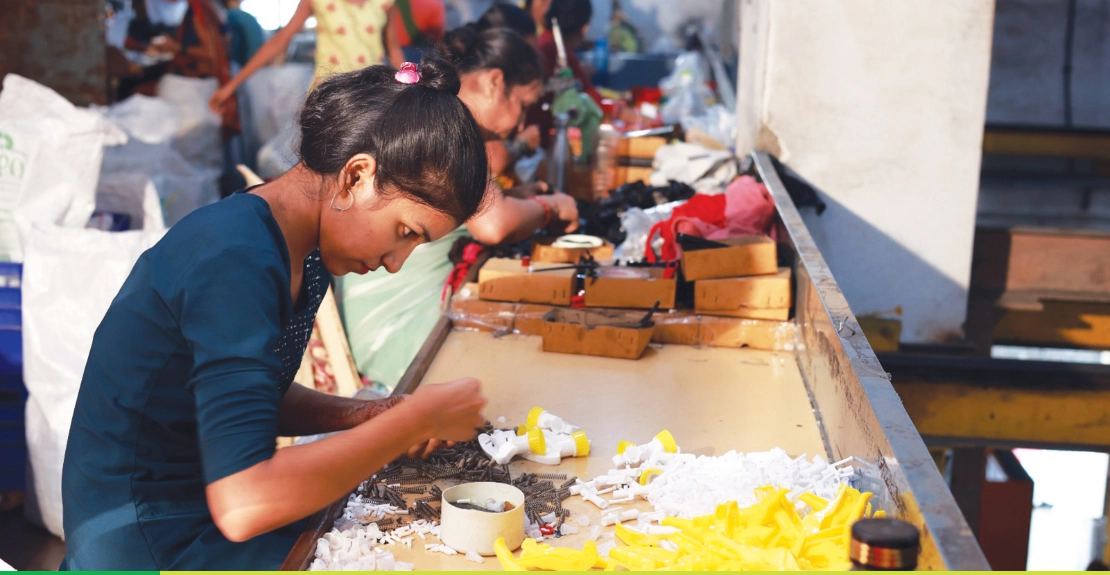
he Indian economy witnessed growth amidst an ongoing global slowdown. It consolidated its position as the fastest growing major economy. While global growth is projected to have slowed down to 2.4% in 2024 from 2.6% in 2023, India’s economy is estimated to have grown by 8.2% in the financial year ended March 2024, sharply higher than 7.0% expansion recorded in the previous fiscal year of FY2023.
The economy demonstrated resilience and warded off global economic shocks owing to the pivotal role played by the Micro, Small and Medium Enterprises (MSME) sector in driving economic growth, fostering innovation and promoting inclusive development. This resilience was led by strong fundamentals including contained inflation, twin-balance sheet advantage (improving balance sheets of banks and corporates), on-track fiscal consolidation, a budget-driven capital expenditure, structural reforms for the ease of doing business and the advancement of digital infrastructure. The MSME sector remains poised to assume an even larger role in India’s journey towards becoming a USD 5 trillion economy by 2030.
Technology has emerged as an effective conduit for facilitating delivery of services to the public, ease of doing business and in the transformation of the financial landscape. Several key steps have been undertaken to revolutionise the financing paradigms for MSMEs, including Udyam Assist Platform for Informal Micro Enterprises (IMEs), Account Aggregator (AA), rapid penetration of UPI/ QR codes, ONDC, and GST Sahay using OCEN protocol and other such digital credit underwriting tools.
The straight through processing of loans through triangulation of GST, Income Tax Returns and bank statements is facilitating digital journeys and standardised financial solutions for MSMEs. However, given the multitude of challenges faced by the MSE sub-sector, adopting a ‘phygital’ approach is essential, particularly for the informal/ nano enterprises requiring effective handholding and advisory.
Considering the rapid development in financial services led by technology, SIDBI works intensively towards driving the MSME agenda forward. Through continuous engagement with the government, SIDBI addresses the needs of MSMEs and encourages its support for their continued success and resilience. With this, its key objective remains to create an enabling and supportive system for Indian MSMEs and empowering them to be globally competitive.
The Bank continues to position itself as a leader in providing tech-driven financial solutions to the MSME sector. To illustrate, SIDBI’s Prayaas scheme which provides assistance of ₹50,000 - ₹5,00,000 to Informal Micro Enterprises (IMEs) through a phygital journey, has so far facilitated over 2 lakh IMEs with cumulative credit of ₹2,500 crore. Over 85% of these were women beneficiaries.
In another such example, Udyam Assist Platform, launched in association with the Ministry of MSME, has crossed 1.60 crore registrations in a short span of over a year ended March 2024. This is a noteworthy accomplishment with the platform aiming to facilitate IMEs into the formalised lending system and incentivise lenders by issuing the Udyam Certificate. As Udyam Assist Platform becomes India’s largest and most inclusive repository given the continued collaboration of stakeholders, ranging from banks, tech players and regulators, this will further strengthen the MSME sector and make it equipped to transform the existing challenges into opportunities.
SIDBI continues to strengthen its risk mitigation and monitoring frameworks by leveraging the latest technological tools. Simultaneously, it has also stepped up its interventions in the area of Green finance for MSMEs, aligning with the government’s sustainable and green initiatives. The interventions and schemes designed by SIDBI are aligned with the government’s multi-pronged approach towards sustainability and climate change, including incentivising the use of energy efficient machinery, solar power, electric vehicles and biogas.


Under the Direct Finance portfolio, SIDBI leveraged on its endto-end digitisation of direct credit operations. Added to this, with expansion of bank network to 96 branches, and scaling up of other direct credit initiatives such as the Co-lending with NBFCs, Prayaas scheme, and discounting on TReDS platform, among others, SIDBI registered 46% YoY growth in direct finance outstanding, which stood at ₹26,826 crore as of March 31, 2024. Growth in direct lending was driven by digital and paperless credit dispensation platform, utilisation of various tools and intelligence reports, scaling up of existing products and expanding our basket of financial intermediaries.
Institutional Finance accounted for 94% of total Loans and Advances with significant growth of 65% under Refinance to NBFCs and 79% in Refinance to MFIs. Credit Outstanding under Institutional Finance stood at ₹4,27,078 crore at the end of FY 2023-24 benefitting 72.84+ lakh beneficiaries. During the year, SIDBI also commenced providing financing to Electric Vehicle (EV) financiers, launched newer products catering to small/lower-rated NBFCs, besides adopting various credit plus initiatives such as NBFC growth accelerator programme and sector studies on MFIs. With these interventions, SIDBI expanded its outreach to the MSME sector and facilitated further flow of credit at competitive rates.
As mentioned earlier, furthering India’s commitment to mitigate the effects of climate change, SIDBI has launched a host of initiatives such as End-to-End Energy Efficiency (4E) financing and Project GRiT (encompassing initiatives on promoting energy efficiency in the MSME cluster and Rural Mobility, Nurture to Nature and Mission Solar). With these calibrated interventions, SIDBI’s green financing portfolio expanded by a remarkable 4.5 times in the year under review.
SIDBI has also aligned itself well with Government of India for nurturing India’s startup ecosystem. It has set up a “Fund of Funds for Startups”, with ₹10,000 crore having been fully committed to 138 Alternative Investment Funds (AIFs). With this, it continued to emphasise its role as a gamechanger for India’s early-stage startup funding ecosystem.
SIDBI also organised frequent Startup Outreach Programs in Tier 2&3 cities, with Venture Capital thought leaders providing them with guidance and mentorship to create sustainable businesses. Further, recognising the temporary liquidity constraints faced by startups between two rounds of AIF funding, SIDBI introduced a special scheme to extend Venture Debt to startups. This debt will be offered to Venture Capital, AIF-supported MSMEs and startups not eligible for conventional debt support. SIDBI also unveiled initiatives to collaborate with India’s leading incubation centres and provide suitable seed capital for investing in viable and scalable startups in these centres.
Mission Swavalamban, which promotes entrepreneurship promotion and development, has been a key priority area for the Bank. In FY 2023-24, SIDBI launched several new programmes targeting various MSME segments, especially those centred around micro entrepreneurs. In FY 2023-24, the Swavalamban Connect Kendra (SCK), which was launched in 2019 as a pilot intervention, was expanded to 67 districts in Bihar, Jharkhand and Nagaland.
During the year, SIDBI also strengthened the entrepreneurship education programme, ‘Skill to Enterprise Model’ (STEM). This is a blended programme for the youth with components of experiential and ‘Learning by Doing’, followed by intensive handholding and mentoring to set up their ventures and enterprises. In FY 2023-24, SIDBI signed an MoU with 10 institutes and universities, including 3 IIMs, for organising and executing these outreach programmes.
SIDBI continues its journey of developing and implementing projects to strengthen the MSME ecosystem in India. The publications in association with credit information bureaus, such as MSME Pulse, Microfinance Pulse, Fintech Pulse, and SPeX, among others, are designed at providing key data insights to policymakers and stakeholders. In FY 2023-24, the Bank scaled up several digital and non-digital interventions for MSMEs, some of which are as below:
SIDBI, along with Jocata, has developed the Sumpoorn Index (from GST sales data) of consenting MSMEs seeking credit from financial institutions. The Index provides, data-backed insights and perspectives on the MSME sector. This is aimed at facilitating policymakers, researchers, as well as business and risk heads in directing timely credit efforts for MSMEs.

The revamped and fully digital Credit Guarantee Fund Trust for Micro and Small Enterprises (CGTMSE) is one such significant player that is facilitating the sector’s growth over the years.
In FY 2023-24, CGTMSE touched a significant milestone by crossing ₹2 lakh crore of guarantee amount, which recorded 94% increase YoY. A cumulative guarantee for 87.96 lakh units with a guarantee amount of ₹6.29 lakh crore has been approved till March 31st, 2024, contributing to employment generation for around 230 lakh individuals. This has been achieved on account of SIDBI’s initiatives taken along with the Ministry of MSME and CGTMSE to facilitate collateral-free lending to MSMEs. It also provides other benefits such as reduction in guarantee fee, raising the eligibility limit of loans for guarantee, relaxing the pre-condition for claim settlement, end-to-end digitisation of operations, among others.
SIDBI will continue nurturing the MSME sector to help it achieve its full potential and to support its journey of creating value for the nation. The Union Budget 2024-25 provides impetus to the MSME sector and a fillip to its growth by supporting MSMEs through innovative measures including a new credit assessment model, providing credit support to small businesses during tough times, increase of MUDRA loan limits and an expanded scope for mandatory TReDS onboarding. SIDBI will continue to focus on MSMEs enterprises through various key initiatives, such as:
SIDBI will continue to focus on leveraging technology and risk management practices to effectively reach out to MSMEs, and work on the above theme-based initiatives, apart from undertaking other strategic interventions for the MSME sector.

Copyright © 2024 Small Industries Development Bank of India(SIDBI)
Designed and Developed by RDX Digital